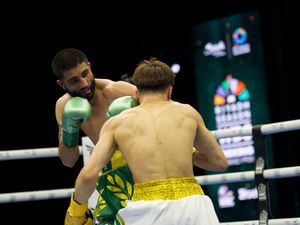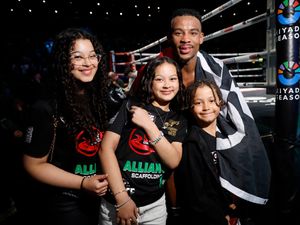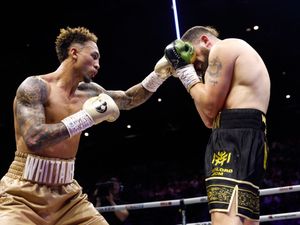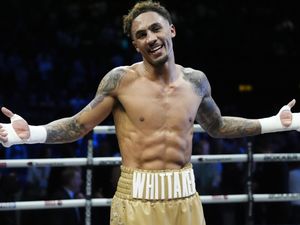The Big Interview - Tommy Hearns
He was the driving force from the Motor City - but Tommy Hearns is and always will be 'the Hitman.'
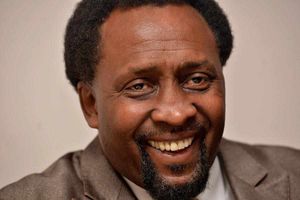
That nickname was well and truly earned through his storied career, where success and failure often came down to who had the most meat in his gloves.
And, as the moniker suggests, if he pinged you with so much as a jab from that big right hand, there was every chance your days were numbered, writes Craig Birch.
It was punch power that travelled up six weights, made him the first man to win world titles in four different divisions and prolonged his glittering pro career to nearly 30 years.
He was one of the famous 'Four Kings' in the 1980s, coldcocking Roberto Duran before the best three rounds of boxing ever with Marvin Hagler.
He fought 'Sugar' Ray Leonard twice and both openly conceded then, and for years to come, that Hearns was robbed the second time.
He brought big time boxing back to Detroit in his native United States, who hadn't been so proud of one of their own fighters since the days of Joe Louis.
Like 'the Brown Bomber,' he was an adopted son of the city. He was born in Grand Junction, Tennessee, before his family moved when he was five years old.
All was not well at home after that, his parents divorced and young Tommy was a little boy lost. A shy child but keen to meet new people, he followed the children in his area to the Kronk Gym.
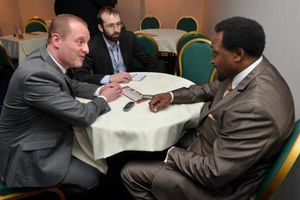
He recalls: "I started boxing when I was nine years old, a lot of the kids in my neighbourhood went along to our local club and, one day, I asked to go with them.
"As soon as I got in there, I was hooked. Everytime you walked into that gym, there was always a challenge from someone.
"There were guys sitting around that would call you out for a fight. And that was just for sparring!
"I never turned down any of them and a lot were surprised by what they were getting in with. I fought them all. Even then, I had something."
Trainer Emanuel Steward became a surrogate parent and would stand alongside him until his death in 2012. They never stopped being close.
Hearns wouldn't turn pro until the time was absolutely right - he had 163 amateur bouts as an uncharacteristic tip-tap light welter.
He finished on a high, winning National Amateur Athletic Union and Golden Gloves titles in the same year he first laced on a paid glove, 1977.
A step up to welter came with the turn, but Steward was confident it wouldn't hurt him. With the way the legendary coach had got him punching, the pain was to be felt by the other corner.
His first 17 opponents fell by way of TKO and only two men had ever been the distance with him by the time he was given a shot at the WBA world title in fight 29.
It was still relatively early in his pro career but this was it - the chance to become the best and a hometown hero in Detroit's Joe Louis Arena.
Champion Jose 'Pipino' Cuevas was a fellow heavy-hitter and many wondered if he was ever going to relinquish his crown, after 11 straight defences.
But a punch heard around the world saw Cuevas' legs crumble under the weight of a right hook, with less than two rounds gone. It struck fear into the hearts of his rivals. Hearns had arrived.
He said: "Emanuel Steward turned me pro and he was the best trainer any man ever had, he taught me everything I know about boxing and about life. He was like a father to me.
"I was always a tall, lanky fighter and he taught me how to keep a man at distance, to use my long reach, so I get the time to do what I wanted to do.
"With my style of fighting, sometimes it's hard to predict what I am going to do. My left jab was so strong that I didn't have to be an inside fighter.
"Emmanuel was a tactical man, he checked out everything and made sure I was in perfect condition every time I was there. He was just straight up boxing.
"For a big fight, there would be seven weeks hard training and we would spar eight to 10 rounds a day. I learned so much, like the things you have to watch out for.
"I was winning by knockout almost every time, but it didn't really surprise me. I had the punch, but I was under-estimated because I was skinny.
"They figured they could take advantage of me and that played into my hands in the early part of my career.
"Winning a world title is what every fighter who ever turns professional dreams about and, when I got my shot, I knew it could really change my life.
"Everybody feared Cuevas, at the time, but I was that determined to take the opportunity I wasn't scared at all.

"For that fight to take place in Detroit was a big thing for me. We were in the Joe Louis Arena, where a boxer had become that popular they named the stadium after him!
"It was tough for any fighter from the city to try and follow him, so it was very important for me to go out there and do Joe proud. He was my hero.
"I got a good shot in the second round to end the fight and I was never that skinny kid again. I was the one that people were afraid of.
"Ring Magazine voted me Fighter of the Year for 1980 and that was a big surprise to me. I had suddenly become so popular."
Three successive title defences followed, before it came time to unify some belts. Again, there was a champion there that would take some beating.
Leonard was back in control of the WBC welter strap that he had lost and regained from Duran and considered Hearns the next pretender.
Another feud for the ages began in 1981, for the then-largest purse in boxing history, and was as staggeringly brutal as expected.
At the end of the 12th round, Hearns had him at his mercy, ahead on the cards with Leonard's left eye swollen shut, hiding the damage of the detached retina which later forced his retirement.
But he had completely run out of gas, evidenced when he was put through the ropes towards the end of the 13th. Only the bell saved him from that one.
Leonard smelled blood and used his last ounce of energy to trap him in the ropes with an overhand right and let his hands go. Referee Davey Pearl stepped in before the fight could end.

